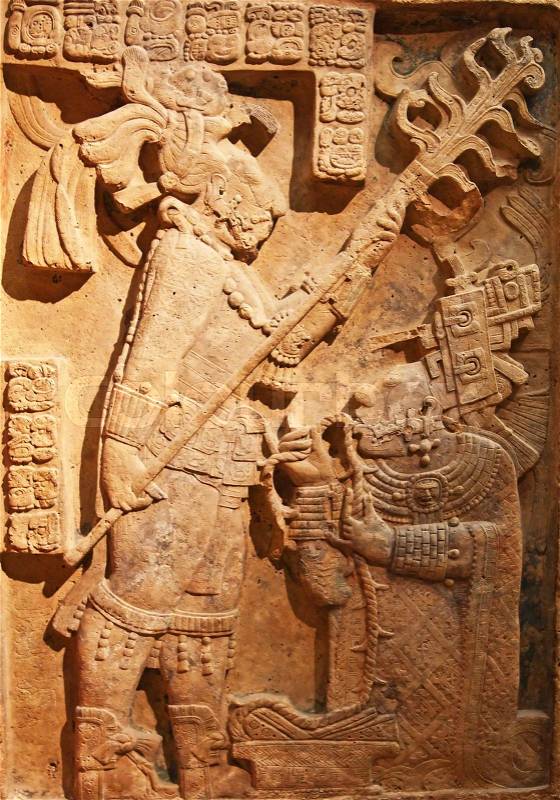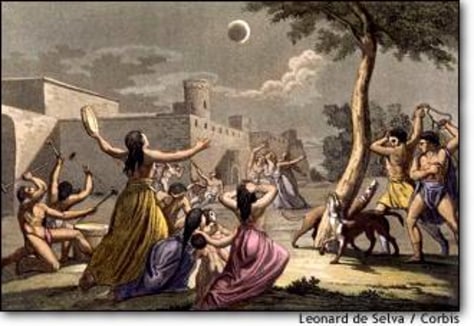It’s one of my favorite time’s of year again, when people
talk about how Columbus
ruined everything. Don’t get me wrong, I’m no big fan of the European take over
of what is now called the Americas .
I’m also not a fan of bad history. According to the memes that come out this
time of year, Columbus
invented slavery.
There is no question that the particular brand of slavery
that existed from Africa to America
and included the natives in the Americas
was particularly horrible in human history. There is no question that
Christianity supported slavery and it was in turn supported by the Old
Testament. It is also unquestionable that slavery has been a part of every
civilization. It’s elimination is very recent and very unique. The colonizers
that began with Columbus
are not unique at all.
Slavery in the Americas
began thousands of years before Columbus
ever got there. And I’m not talking about the Vikings. Native tribes conquered
and enslaved each other. I’m not going to provide links, by the way, since this
is too well known to bother. Also well known is the participation of Africans
in the African slave trade. None of this makes any of it right. That something
has been done throughout human history is not an argument for it being normal,
ethical or intractable. People who took slaves were always wrong. They were
also products of their environment.
One easily misused statistic is the number of people who
died in the centuries following 1492. It was on the level of the Nazi
holocaust. Pre-Columbian population figures are a little hard to come by, but
deaths were in the millions. We know there were conquistadors sweeping across
the southern continent and small colonies moving in along the east coast at
this time. But millions of deaths spread across vast stretches of territory
that were unmapped by Europeans have to be accounted for. The only sensible
explanation is disease.
The Americas
were first populated by people crossing the Bering Strait
land bridge 10,000 years ago. Generations of living in extreme cold in Siberia
and the tundra of the Americas
killed off a lot of immunity that people in Europe
maintained. Europe and Asia have cows, pigs
and horses and constant contact with those animals weeded out anyone not immune
to the diseases they carry. When they came back in contact with their cousins
that they had parted with so long ago, they brought those diseases with them.
No, I’m not ignoring that this was later done deliberately,
but that was much later. Missionaries that gave Indians infected blankets did not
exist until colonies were well established. Missionaries can’t exist at all
without a strong military presence protecting them. The history of that is also
confused and sometimes exaggerated, but it certainly had nothing to do with Columbus .
Neither am I ignoring that by today’s standards, Columbus was a wack job.
I recently read “Columbus and the Quest for Jerusalem ”. The title
alone grabbed my attention. He never went to Jerusalem ,
but according to his own diary, his intention for finding a route to India was to enrich Spain
and the Catholic Church so they could re-conquer Jerusalem . If you remember, Jerusalem was under Muslim rule at the time. Columbus would out
fundamental any fundamentalist of today. And why not? That’s all there was.
There was no discussion about freedom of religion, you took the religion of
your kingdom, or you got out of there, alive if you were lucky. If the Pope
said slavery was okay, it was okay. Martin Luther was only 9 years old. It was
a different time that we can barely understand. Having Christians in control of
the birthplace of Jesus was vitally important to the survival and future of Columbus ’ culture. The
idea of Jews at the Wailing Wall, the sound of the Muslim call to prayer and
tours of Jesus’ tomb all in one city would be unheard of to him.
Despite his confusion about the size of the earth, Columbus was a decent
navigator, he did make contact with another culture, and he did find gold. If
you think any of that was easy, read this story about how he was stranded on Jamaica for a
year. A few of his men found their way back to Haiti(then called Hispaniola) in what was essentially a canoe. This was also the time he lied to the natives about controlling the sun when he
knew of an eclipse that was coming. He did it to gain favors from them. Anyone
who tells that story without also telling of how he did it when he was cut off
from anything resembling his civilization, is essentially lying by omission.
The above link also mentions Bobadilla. This was another
reason I picked up the book. I had heard of a letter that had recently been uncovered listing many crimes of Columbus. You may have heard of it. As I read the book, I kept expecting to hear about
these crimes, but they weren’t listed, at least not coming from Columbus . Columbus writes about events going on across
the island that were out of his control and that he did not condone. Maybe he
could have done more to prevent them.
Instead of entries about thoughtless treatment, I read of
how he had to leave some men behind on his first voyage and gave them strict
instructions to stick to themselves and not bother the natives. Now, he also
took natives with him against their will, so he was no saint. When he returned
he found the men he had left behind had fought with the natives, and they (Columbus ’ men) had been
killed. Getting their killers to describe what had happened of course would
have been a challenge.
The history of the rest of what happened during Columbus ’ life is, shall
we say, muddled. He was told by Spain
not to take slaves, but he did anyway, even sending some of them back to Spain . There
seemed to be no penalty for this. Even at the time, Ferdinand and Isabella couldn’t
figure out what was going on and had to send investigators. The second voyage
was definitely a military mission and included priests and farmers who
established colonies. Those priests complained that in some of those colonies
the slaves were mistreated. To me today, “mistreated slave” is kind of an
oxymoron. You’ve already taken someone away from their culture and made them
work for free. How is that okay, but there is still a further line that
crosses into “cruelty”?
It is hard to tell from the few records we have, but the
theme of the book I read was that many of the people who were brought to
colonize this new world expected gold to be flowing out of the hills and slaves
to bring it to them. When they found out they had to work, and that the “New
World” had new diseases, they blamed Columbus
for mismanagement. This is when Bobadilla enters the story and puts Columbus in chains.
When the story is told as if everything in Bobadilla’s
letter is true, it sounds strange that Columbus
was released and allowed to return, although he was stripped of his governorship.
It makes more sense when you read accounts of the monarchs who found it strange
that Columbus
arrived at court in manacles. This was perhaps a shrewd political move by Columbus because the
Captain of the ship that took him home offered to remove them. But Columbus wanted his
patrons to see how Bobadilla had treated him. I lean more toward the theory
that Bobadilla wanted to rule the territory without having had to do all the work of
discovering it.
I can hardly summarize a book in six paragraphs and
everything I’ve said comes with a disclaimer that the history is incomplete. My
intention here is to supply a little more background than a painting from 500
years ago or a scrap of evidence with no context. How we treated the people we
called “Indians” in later centuries; cutting their hair, making their language
illegal, killing off the buffalo, all of that is inexcusable. It was also
supported by our government after we had made a constitution that spoke of
freedom and human rights. It was perpetrated by Presidents that we call heroic.
Anyone living in the United
States today benefits from those policies,
excluding of the course many of the descendants of the people who were here
first. We would be better off discussing how that affects people alive today
than either celebrating or denigrating a man we know little about from 500
years ago.



No comments:
Post a Comment